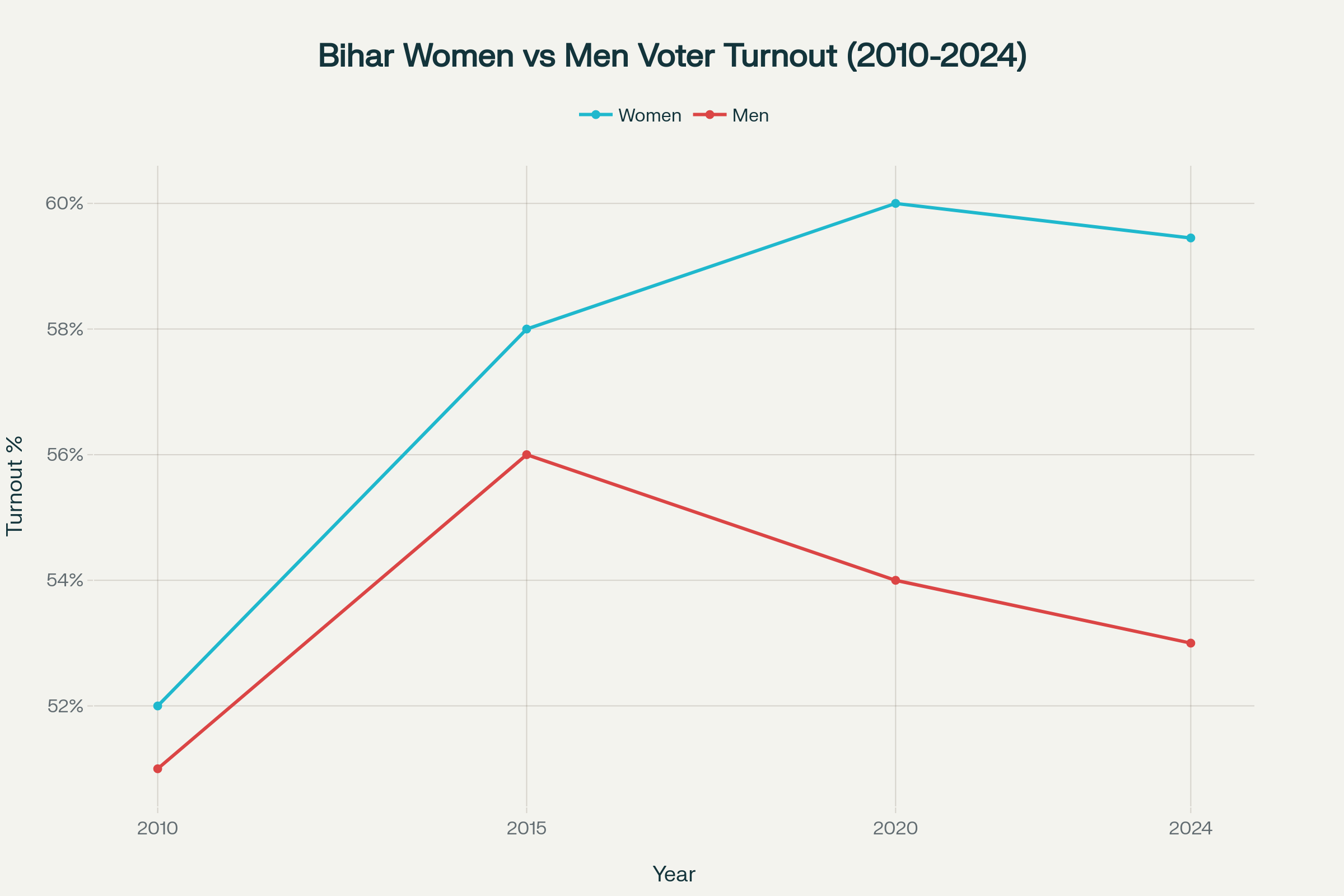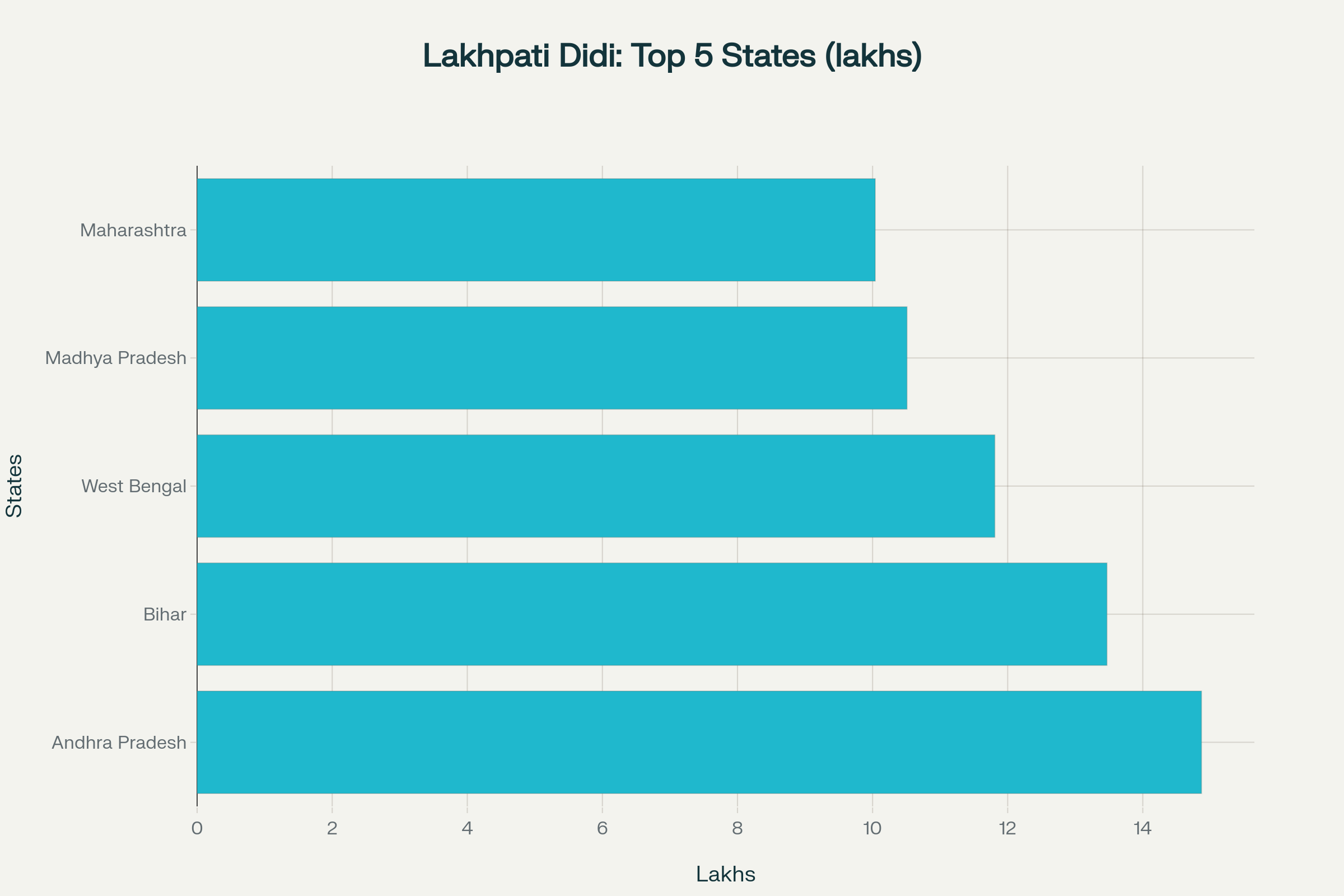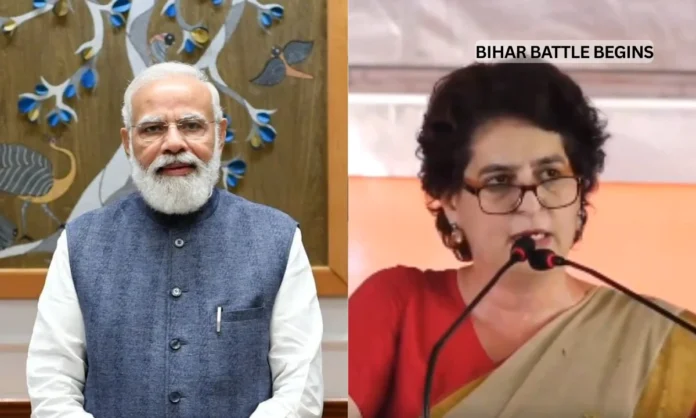Key Highlights:
- PM Modi launched Mukhyamantri Mahila Rozgar Yojana transferring Rs 10,000 to 75 lakh women on September 26, 2025
- Priyanka Gandhi countered with promises of land ownership rights for women during her Bihar visit
- Women voters have consistently outvoted men in Bihar since 2010, achieving 59.45% turnout in 2024 Lok Sabha elections
Opening Overview
The Bihar women voters political contest has reached unprecedented intensity as assembly elections approach in October-November 2025, with Prime Minister Narendra Modi and Congress general secretary Priyanka Gandhi Vadra launching competing campaigns to secure the crucial female electorate. On September 26, 2025, both leaders simultaneously targeted women voters through distinct strategic announcements, transforming the Bihar women voters political contest into a defining feature of the upcoming electoral battle.
This fierce competition reflects the growing political significance of women voters, who have consistently demonstrated higher turnout rates than men since 2010 and currently constitute 47.2% of Bihar’s electorate. The Bihar women voters political contest has become central to electoral strategy, with parties recognizing that women’s participation patterns often determine constituency outcomes across the state’s 243 assembly seats.
Modi’s Strategic Women Empowerment Initiative
Prime Minister Modi’s approach to the Bihar women voters political contest centered on launching the Mukhyamantri Mahila Rozgar Yojana, representing the largest direct benefit transfer to women in Bihar’s electoral history. The scheme involves transferring Rs 7,500 crore directly to 75 lakh women’s bank accounts, with each beneficiary receiving Rs 10,000 as initial support for employment and entrepreneurial activities. This initiative positions the Bihar women voters political contest within a broader framework of women’s economic empowerment, connecting state-level interventions with national programs like the Lakhpati Didi scheme. The timing of this announcement, coming just weeks before elections, demonstrates the strategic importance of the Bihar women voters political contest in determining electoral outcomes.
बिहार की माताओं-बहनों और बेटियों के कल्याण के लिए डबल इंजन सरकार समर्पित भाव से कार्य कर रही है। इसी क्रम में आज ‘मुख्यमंत्री महिला रोजगार योजना’ का शुभारंभ करना मेरे लिए बहुत गर्व की बात है। https://t.co/pntJaWKPRm
— Narendra Modi (@narendramodi) September 26, 2025
- The scheme provides financial assistance to one woman from each family in Bihar for starting employment or livelihood activities across diverse sectors
- Beneficiaries can access additional support extending up to Rs 2 lakh for successful entrepreneurial ventures, along with specialized training programs
- Bihar already operates nearly 11 lakh active self-help groups, providing established infrastructure for implementing the Bihar women voters political contest strategy
Modi’s messaging in the Bihar women voters political contest also included sharp criticism of opposition governance, particularly targeting the Rashtriya Janata Dal’s track record on women’s safety and development. The Prime Minister emphasized infrastructure improvements under NDA governance, highlighting better roads, connectivity, and law enforcement that have enhanced women’s mobility and security. His strategy frames the Bihar women voters political contest as a choice between continued progress under current leadership versus regression to previously challenging conditions for women.

Bihar women voter turnout has consistently exceeded men’s participation since 2010, with the gender gap widening over time
Priyanka Gandhi’s Counter-Strategy and Alternative Vision
Priyanka Gandhi’s intervention in the Bihar women voters political contest focused on questioning both the timing and sustainability of Modi’s announcements while presenting structural reform alternatives. During her Mahila Samvad program in Patna, she challenged the electoral motivations behind the Rs 10,000 transfer, characterizing such pre-election announcements as transparent attempts to influence the Bihar women voters political contest through financial inducements. Her critique emphasized the NDA’s 20-year governance record, questioning why substantial financial support for women was only announced months before elections when the Bihar women voters political contest became electorally crucial. Gandhi’s strategic positioning emphasized long-term policy commitments rather than election-driven announcements in the Bihar women voters political contest.
बिहार की जनता को महागठबंधन की गारंटी:
— Priyanka Gandhi Vadra (@priyankagandhi) September 26, 2025
◾गरीब परिवारों को उद्योग के लिए 2 लाख तक की मदद
◾विधवा, दिव्यांगजन, वृद्ध पेंशन 1500/माह, हर वर्ष 200 रु की वृद्धि
◾भूमिहीन परिवारों को मकान हेतु 3 से 5 डिसमिल जमीन, मालिकाना महिलाओं को
◾हर विधानसभा में रोजगार के लिए 10 करोड़ का… pic.twitter.com/QVCVDClRph
- Gandhi announced Congress’s commitment to providing 3-5 decimals of land to every landless family, with ownership titles registered exclusively in women’s names
- The land ownership promise addresses structural inequality and provides permanent asset ownership rather than one-time transfers in the Bihar women voters political contest
- Her extended Bihar engagement included rallies in both Patna and Motihari, demonstrating sustained commitment to the Bihar women voters political contest beyond capital-centric campaigning
The Congress leader’s approach to the Bihar women voters political contest emphasized grassroots engagement through direct interaction with women’s self-help groups and community organizations across rural constituencies. Her rally in Motihari, extending outreach beyond the state capital, recognizes that the Bihar women voters political contest will be significantly determined by rural women voters who constitute the majority of the female electorate. This geographical strategy acknowledges that success in the Bihar women voters political contest requires mobilizing women voters across diverse constituencies, particularly in northern Bihar where women’s turnout historically exceeds men’s participation.
Electoral Significance and Statistical Context
The Bihar women voters political contest builds upon established patterns of female electoral participation that have fundamentally altered Bihar’s political landscape since 2010. In the 2024 Lok Sabha elections, women achieved a remarkable 59.45% turnout compared to 53% for men, with this 6.45 percentage point gender gap representing the widest margin in recent electoral history. These statistics demonstrate that the Bihar women voters political contest reflects empirical electoral realities where women’s voting patterns increasingly determine constituency outcomes across the state. The trend has been particularly pronounced in northern Bihar constituencies, where women outvoted men in 167 of 243 constituencies during the 2020 assembly elections.
- Women voters constituted 47.7% of Bihar’s electorate in January 2025, decreasing to 47.2% following Special Intensive Revision of voter rolls
- The widest gender turnout gap in 2020 occurred in Baisi constituency with women’s turnout exceeding men’s by 22 percentage points
- Bihar ranks second nationally in Lakhpati Didi beneficiaries with 13.47 lakh women achieving annual incomes exceeding Rs 1 lakh
The Bihar women voters political contest occurs against the backdrop of significant demographic changes in the electoral rolls, with approximately 65.7 lakh voters removed during recent revisions. Significantly, 36.59 lakh of these deletions involved women voters compared to 29.3 lakh male voters, raising concerns about potential impact on the Bihar women voters political contest. This demographic shift adds complexity to electoral calculations as parties must account for changing voter composition while developing strategies for the Bihar women voters political contest.

Bihar ranks second nationally in creating Lakhpati Didi beneficiaries with 13.47 lakh women achieving annual income above Rs 1 lakh
Policy Implications and Long-term Impact
The intensity of the Bihar womens voters political contest reflects broader transformations in Indian electoral politics where women’s participation has evolved from peripheral to central in determining electoral outcomes. Both Modi’s economic empowerment approach through direct transfers and Gandhi’s structural reform proposals through asset ownership represent sophisticated understanding of women voters’ diverse priorities and concerns. The Bihar women voters political contest has elevated gender-focused policies from campaign promises to core electoral strategies, influencing policy formulation across party lines. This competition demonstrates how the Bihar women voters political contest has transformed women from passive beneficiaries to active political stakeholders whose preferences shape governmental priorities.
The Bihar women voters political contest also highlights the intersection between welfare schemes and electoral strategy, with both parties leveraging existing programs while announcing new initiatives specifically targeting women voters. Modi’s integration of the state scheme with national programs like Lakhpati Didi demonstrates how the Bihar women voters political contest connects local electoral dynamics with broader policy frameworks. Similarly, Gandhi’s land ownership proposals represent structural interventions that could influence the Bihar women voters political contest beyond immediate electoral cycles.
Closing Assessment
The Bihar women voters political contest represents a watershed moment in Indian electoral politics where women’s participation has evolved from statistical observation to strategic imperative for political success. Both Prime Minister Modi’s economic empowerment initiatives and Priyanka Gandhi’s structural reform proposals demonstrate sophisticated recognition that the Bihar women voters political contest requires substantive policy engagement rather than symbolic gestures.
As Bihar approaches its assembly elections scheduled for October-November 2025, the Bihar women voters political contest will likely establish precedents for women-centric political campaigning that extend beyond state boundaries to influence national electoral strategies. The outcome of this Bihar women voters political contest will determine not only immediate electoral results but also shape the future trajectory of gender-focused governance and policy formulation across India.


